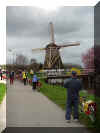Monday - Windmills and Polders
Today we will head for Schoonhoven, but first, we stop by this castle reproduction...
We travel through polder country and see many more windmills. Though most windmills were used for water pumping, they were also used to power sawmills and to grind grain or make oil.
During a stop at a museum, we learn how the Dutch first used windmills and later steam-driven and electric pumps to keep their land dry.
A Word About the Language... It helps if you're Phlemish
Whenever we travel to a non-English speaking country (or go outside the house here in San Antonio), I try to learn a bit of the local language. Spanish is OK, Italian was similar enough to Spanish to be workable, French was so-so (though we can't forget the infamous French fry sandwich incident in rural France), but Dutch...
First of all, they use too many vowels - consider Haarlem, paad (path), etc. - when I had the problem of too many vowels in my writing, I got a new keyboard for the computer (Diet Coke will gum up the works and make keys repeat). You would think that the Dutch, being so thrifty, would cut down on the vowels just to save on printing.
Many languages have idiosyncratic sounds that are hard to learn, such as the rolled "r" of Spanish, or the nasal sniffs of French (perhaps that one is just attitude, but you get my drift.) Dutch, on the other hand, has two very specific sounds that only someone with chronic sinus disease can duplicate.
First, there is the "spit-raising" sound. The sound you make in raising a wad of spit is one of the two key sounds to communicating in Dutch. This sound is common in such words as "Shoonhoven" (pronounced "spit-sound/hoven").
The second sound - that I've termed the "phlegm" sound - is used in approximately 90% of the rest of the language. To make this sound, you must have a case of chronic post-nasal drip. Let the phlegm drain to the back of your throat. Now, hock it up while saying the word "ach". If you don't have to spit, you haven't done it right.
I think the climate helps. One morning, after a particularly cool and humid night, I came up to breakfast. After listening to my quick round of snorting and hacking, the captain remarked that he didn't know that I was so fluent in the language.
Armand tried to help, but we finally decided that you have to be born Dutch to speak it. This is probably why English language instruction is part of the entire school curriculum. Virtually everyone (though not all) understand and speak English.
In this area, we also see many houses with thatched roofs. Though you might think that only old houses would use this roofing material, we saw new houses being thatched as well. Even windmills were thatched.
We return to the boat to find a new cook. On Sunday, Noe, the cook was notified that her mother had died in Thailand, so she had to leave for the funeral. She was replaced by a new cook, an English woman. Our dinner tonight is tuna salad, green salad, spaghetti and meat sauce and chocolate pudding - overall, not too bad.
After dinner, a few of us go to a local bar for a beer. There we discover that drunk rednecks are not a phenomenon limited to the southern U.S. After a rousing bit of political discourse sprinkled with anti-Americanism (a bit of a debate over my poor world view and inability to name the president of Scotland - OK, I said I didn't necessarily give a rat's ass who the guy was and their inability to name the president of Mexico - and no, fellas, he's not some guy with a "Mexican name", among other things), I thought it best to return to the boat, rather than continue the discussion to its logical conclusion (though Armand did assure me that he had been in plenty of bar fights and would have lent a hand if necessary.)




